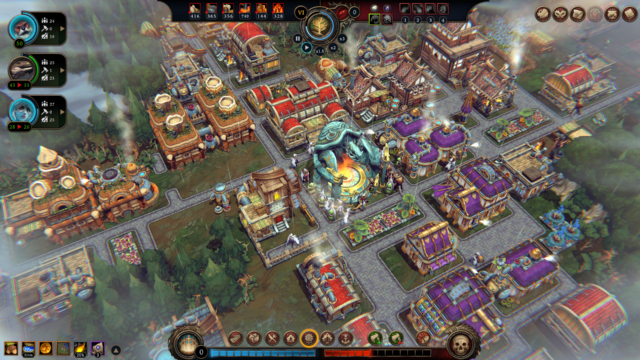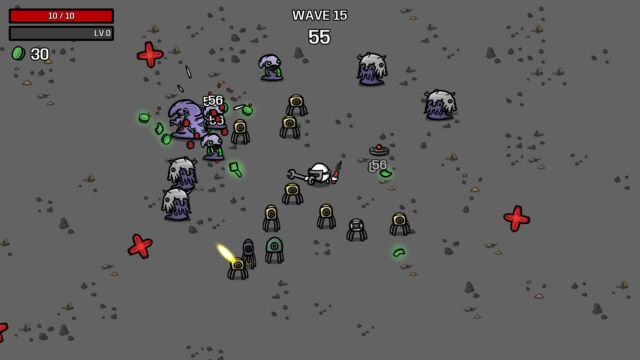The years are absolutely packed —
2022’s relative drought leads to an absolutely packed year of major epics.

It’s been a real period of feast or famine in the video game industry of late. Last year in this space, we lamented how COVID-related development delays meant a dearth of big-budget blockbusters that would usually fill a year-end list. In 2023, many of those delays finally expired, leading to a flood of long-anticipated titles over just a few months.
But the year in games didn’t stop there. Beyond the usual big-budget suspects, there were countless delightful surprises from smaller indie studios, many of which came out of nowhere to provide some of the most memorable interactive experiences of the year.
These two trends make it difficult to narrow this year’s best games down to just 20 titles. The “shortlist” we assembled during the winnowing process easily approached 50 titles, most of which could have easily made the list in a less packed year—or been swapped with a game that did make this year’s list.
Looking back years from now, 2023 may be mentioned in the same breath as 1998 and 2007 as years that were packed to the gills with classics. Here are 20 titles released this year that we think will stand the test of time, sorted in alphabetical order, with a single “Game of the Year” pick at the end.
Against the Storm
Eremite games; Windows
With most games I played and wrote about this year, even the titles I really liked, I would tell myself, “I could see playing this more.” With Against the Storm, I’m not just imagining it, I’m actively plotting ways to make it happen.

This game is stuck in my mental queue because of how surprisingly well the core gameplay loop works. You create the kinds of little villages you’d make in a typical real-time strategy game, except there’s no real-time battle, just a gradual push against time to gather enough resources, deliver the right goods, and keep everyone moderately happy. You can save any time, but each session can also be played in about an hour. It’s deep, but it’s also calm. Even the “roguelite” map-wiping aspect of the game isn’t a punishment but, rather, a reminder not to worry too much about any one level.
Against the Storm is also now Steam Deck Verified, having made lots of changes to how controllers, gamepads, and on-screen text are displayed for that tinier screen. It’s a smart move to make this session-friendly game more couch-capable.
You can pick out a few distinct genre influences in Against the Storm, a handful of specific art homages, and probably quite a few mechanics plucked from other games. But it is very much its own game, one that has been tuned well over its early access period. I keep finding myself hoping for little stretches of time where I can break away from daily life so I can have a bunch of villagers, a queen, and unknowable forest spirits demand more and more of me. It’s quite weird, but it works.
-Kevin Purdy
Alan Wake 2
Remedy Entertainment; Windows, PS5, Xbox Series X|S
I am not really in the target audience for Alan Wake 2. I only played a few brief moments of its predecessor, and I’ve never really gone deep on survival horror shooters, having bounced off the Resident Evil titles in my youth. And while I was initially thrilled with developer Remedy’s last title, Control, the combat felt too repetitive and grinding for me to keep pushing through it for one more head-melting story reveal or another cleverly worded office memo.

Remedy
And yet I think Alan Wake 2 is an inspired, fascinating, entertaining game, one that I’d recommend to nearly anybody. Anybody, in particular, who digs The X-Files, Twin Peaks, Stephen King, Resident Evil, meta-fiction, Control, True Detective, or pondering dark myths amid the beauty of the Pacific Northwest’s majestic, damp forests or a lucid-dream version of New York City.
AW2 gives Remedy the breadth and budget to tell the kinds of stories it’s best at telling. Even if I found the gun-focused but bullet-constrained combat a bit of a slog at times, I wanted to push through. I wanted to watch Saga Anderson discover and react to the reality-altering mystery she was investigating. I wanted to have more moments like when Wake was thrust onto a talk show couch, unaware of the book he was there to promote.
There’s also a musical number. This isn’t a game where you can see the beats coming.
Like 2022’s game of the year, Elden Ring, AW2 feels like a distillation but also an expansion of all the games that came before it. It’s not going to be for everyone, but it provides a wonderful service for those who commit to sitting down with it.
Brotato
Thomas Gevraud; Windows, Switch, iOS, Android
Last year, the cheap, pixel-graphics indie roguelite Vampire Survivors was my personal game of the year. I wasn’t alone in my obsession. Although it wasn’t technically the first of its kind, Vampire Survivors kick-started a new genre in which an auto-attacking hero faces down ever-increasing hordes of enemies. I’ve played a ton of these “Survivor-likes” over the past year, and many of them are quite good. My favorite by far, though, is Brotato, which saw its 1.0 release this year.

In Brotato, you maneuver the titular potato-bodied hero around a small arena. Enemies rush toward your position, and when they’re in range, your character attacks them automatically. But instead of the 20- to 30-minute rounds common in the genre, a Brotato run is split into 20 bite-sized fights that last anywhere from 20 to 90 seconds.
Defeated enemies drop “materials,” which double as experience points and money. You visit a shop between rounds and can spend as much money as you want to buy items and weapons to buff up your character. This is where the game gets its addictive pull. There are 16 main stats, and the key to success is leaning into the ones that help your character the most. Items often have a positive and a negative, so balancing is key.
In short, the game is a min-maxer’s dream.
Forty-four unique characters, six difficulty levels, dozens of weapons, and hundreds of items—unlocked as you play the game—ensure you have a ton of content to chew through. The best thing about the game is coming up with wacky build ideas and seeing if you can make them happen. Adjusting your stats from round to round makes a huge difference, and choosing the right items becomes surprisingly intuitive.
The game is a scandalously cheap $5 (or free to try on mobile). If you are at all interested in stat-building in games, you need to try this.